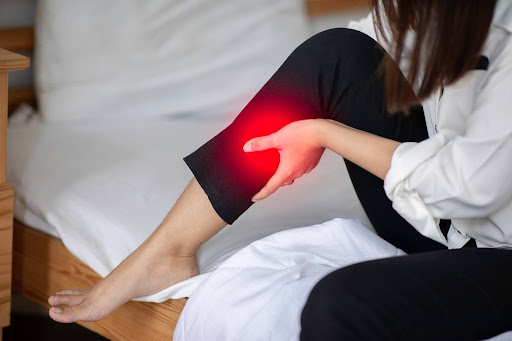You’re sound asleep when a bolt of pain shoots through your calf. The muscle tightens like a knot, and you jolt awake, trying to stretch it out. It only lasts a minute, but your leg stays sore long after the cramp fades.
Leg cramps at night, also called nocturnal leg cramps, aren’t unusual. These cramps are usually harmless, but they can be frustrating and painful.
Sometimes they’re tied to lifestyle habits, other times to medical conditions or medications. Either way, you don’t have to put up with them.
In this guide, you’ll see why they happen, what helps in the moment, and the habits that may reduce how often they occur.
What Are Nocturnal Leg Cramps?
Nocturnal leg cramps are sudden, involuntary muscle contractions that happen at rest, often waking you from sleep. They usually affect the calf muscles but can also involve the feet or thighs.
During an episode, the muscle feels hard and locked. The pain can last seconds or minutes, and soreness may linger once it eases.
Unlike restless legs syndrome, which causes an urge to move, these cramps keep the muscle fixed in place.
Common symptoms of nocturnal leg cramps include sharp pain in the calf or foot, a visibly tense or knotted muscle, and muscle weakness after the spasm passes.
Suggested Reading:
Painful Thighs: Common Causes, Warning Signs, and Care
What Triggers Nighttime Leg Cramps?
Night leg cramps may seem random, but several factors can set them off:
- Lifestyle habits: Sitting for long periods, standing on hard floors, or sleeping in an awkward position can strain leg muscles. Intense exercise may also overwork the calves and set off cramps.
- Dehydration and mineral imbalance: Low levels of magnesium, potassium, or calcium interfere with muscle function and may cause nocturnal cramps.
- Medical conditions: Pregnant women often report cramps due to extra weight and changes in blood flow. Kidney disease, peripheral neuropathy, diabetic nerve damage, and varicose veins also increase the chance of cramping episodes.
These triggers explain why nocturnal muscle cramps may strike without warning.
What to Do When Leg Cramps Strike at Night
When a cramp wakes you, quick action can ease the pain and relax the muscle. These methods often bring relief during a cramping episode.
- Massage the area: Use your hands to rub the affected muscle. Gentle pressure can help loosen the knot.
- Apply heat or cold: A warm compress may relax tense leg muscles. An ice pack can numb pain and reduce soreness.
- Stand or walk: Light movement restores blood flow and may stop the spasm faster.
- Breathe deeply: Slow breathing helps your body relax while the muscle resets.
A nighttime muscle cramp often passes on its own. These steps can shorten the discomfort and reduce soreness afterward.
Once you know how to respond in the moment, you can focus on preventing leg cramps before they start.
How to Prevent Nighttime Leg Cramps
Prevention focuses on reducing the risk factors that make cramps more likely. Several lifestyle adjustments lower the risk of nocturnal cramps.
Stretch Regularly
Calf muscles that remain tight are more likely to spasm. Stretching them before bed helps prevent sudden cramps. Try the wall stretch.
Step one leg back, keep both feet flat, and press the back heel down. Hold for 15 seconds, then switch sides.
Hamstring stretches also reduce strain. Sit with your legs extended and reach forward without bending your knees. Short sessions of stretching during the day can also protect against rest cramps later at night.
Stay Hydrated
Dehydration often triggers cramps. Drink water throughout the day to support normal muscle function. If you engage in physical activity or spend long periods in hot environments, add electrolyte-rich drinks to restore balance.
People who notice frequent nocturnal cramps after sweating should focus on hydration earlier in the day rather than waiting until bedtime.
Focus on Nutrition
Add bananas, leafy greens, beans, yogurt, and nuts to your meals to help maintain nutritional balance.
Supplements such as magnesium citrate are an option, but consult a doctor first, especially if you have an underlying condition or take prescription medication.
A diet that supports electrolyte levels reduces both cramps and related symptoms like muscle weakness.
Warm Bath Before Bed
Warm water relaxes tight muscle fibers and supports blood flow. A bath before bed can ease calf muscles prone to spasms.
If a bath isn’t practical, a heating pad or a warm towel across the legs offers similar relief. These methods calm the affected muscle groups and lower the chance of cramping episodes during rest.
Limit Alcohol and Caffeine
Alcohol and caffeine can interfere with hydration and circulation. Regular intake, especially in the evening, may raise the risk of nocturnal cramps.
Reducing these drinks improves hydration balance and may lessen both cramps and other symptoms, such as leg discomfort.
Stay Physically Active
Light physical activity keeps blood flow steady and lowers tension in the legs. Walking, swimming, or cycling are effective ways to support circulation.
However, overexertion can cause cramping episodes, especially if muscles lack proper recovery.
Physical therapy may also help people with sleep disorders or neurological disorders who experience frequent cramps tied to an underlying condition.
Adjust Your Sleeping Position
Pointed toes shorten calf muscles and make cramping episodes more likely. Keep your feet flat against the mattress or angle them slightly upward with a pillow.
Some people reduce nocturnal cramps by placing a pillow under their knees, which lowers strain on the calves.
Attention to sleeping position is an effective treatment for people who frequently wake with nocturnal cramps.
When Should You Seek Medical Attention?
Most nocturnal cramps pass quickly and aren’t linked to serious problems. But in some cases, frequent or intense cramps signal an underlying condition that needs professional intervention.
- Persistent or severe pain: If cramps happen often or cause pain that lingers, a doctor should evaluate possible chronic persistent leg cramps.
- Underlying medical conditions: Kidney disease, circulation problems, or nerve disorders can raise the risk of frequent nocturnal cramps and require a differential diagnosis.
- Medication side effects: Blood pressure drugs, diuretics, or statins may trigger cramping episodes. Tell your provider if symptoms started after a new prescription.
Seek immediate care if a cramp comes with sudden swelling, redness, or warmth in the leg. These can indicate a blood clot.
Treatment Options for Nocturnal Leg Cramps
Treatment for nocturnal leg cramps focuses on immediate relief and long-term prevention. Some options help during a cramp, while others reduce the chances of future episodes.
Massage Therapy
Massage therapy helps release tight calf muscles and improve blood flow in the legs. This reduces the likelihood of nocturnal cramps and eases soreness after a cramping episode.
Many patients also report less muscle weakness after regular sessions. Massage can be helpful for people with varicose veins or diabetic nerve damage that makes nocturnal cramps more frequent.
Acupuncture
Acupuncture stimulates precise points that relax muscles and improve circulation in the legs. It reduces cramping episodes and lowers discomfort linked to nocturnal cramps.
Some patients also notice improved sleep quality, since fewer spasms interrupt their rest.
Physical Therapy
Patients with neurological disorders, circulation issues, or recurring calf muscle tightness may benefit from physical therapy.
A therapist may guide patients through stretching programs, strengthening exercises, or gentle activities such as a stationary bicycle to improve blood flow.
These methods not only treat nocturnal cramps but also address related concerns like muscle weakness and balance problems.
Lifestyle and Nutritional Guidance
Wellness and Pain also provides guidance to help patients adjust their daily habits. Recommendations may include drinking enough water throughout the day and adding foods that supply magnesium, potassium, and calcium.
Doctors may also suggest modifying an exercise routine to reduce cramp triggers. Supplements may be suggested if food alone doesn’t provide enough support.
Medical Evaluation
If nocturnal cramps persist, a doctor may order tests to rule out conditions such as kidney disease or peripheral neuropathy.
Internal medicine specialists can determine whether cramps are connected to circulation problems, neurological disorders, or another underlying condition.
This helps doctors develop a treatment plan that targets the source rather than offering only symptomatic treatment.
End Nighttime Muscle Cramps With Wellness and Pain
A nighttime muscle cramp can leave you wide awake and sore long after it passes. People experiencing cramping regularly often face an underlying cause that won’t resolve with at-home remedies alone.
Wellness and Pain treats nocturnal leg cramps with therapies that improve circulation, support nerve health, and restore mineral balance. Their doctors also guide patients through lifestyle adjustments that help reduce recurring charley horses and related discomfort.
You don’t need to endure another restless night. Schedule an appointment with Wellness and Pain to create a treatment plan that resolves recurring nighttime cramps.
FAQs About Leg Cramps at Night
How can I stop my legs from cramping at night?
Stretch your calf muscles before bed and keep your feet flat against the mattress. Light walking during the day improves circulation.
If nocturnal cramps continue, a doctor may look for an underlying cause such as varicose veins or peripheral neuropathy.
What deficiencies cause leg cramps at night?
Low levels of magnesium, potassium, or calcium may trigger cramps. These minerals help regulate muscle contractions.
Doctors sometimes recommend supplements or diet changes when patients experience frequent nocturnal cramps linked to a deficiency.
What should I drink before bed for leg cramps?
Water is the safest option. Proper hydration lowers the risk of a nighttime muscle cramp. Electrolyte drinks can also help after heavy sweating, especially if cramps tend to strike as you’re falling asleep.
What drink stops leg cramps?
There isn’t a single drink that works for everyone. Some people report relief with electrolyte-rich fluids, while others feel better after warm tea that relaxes muscle tension.
If cramps persist, a doctor may prescribe muscle relaxants or check for medical conditions such as kidney failure that interfere with mineral balance.











